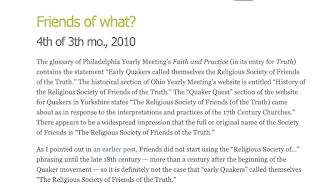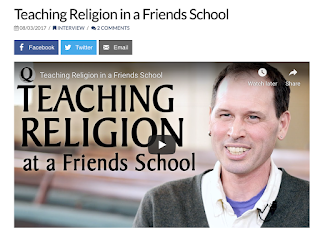We framed our conversation with the Quaker idea and testimony of Truth. We considered what Truth might mean in the context of teaching and learning in a Friends school using these resources:
Friends of What? (Quaker Historical Lexicon)
https://quakerlexicon.wordpress.com/tag/friends-of-truth/
Guided by an Inner Truth (QuakerSpeak, Sterling Dunn, 04/16/2015)
https://quakerspeak.com/guided-inner-truth/
 Truth is Something that Happens (Quaker Earthcare Witness, Louis Cox)
Truth is Something that Happens (Quaker Earthcare Witness, Louis Cox)https://www.quakerearthcare.org/article/truth-something-happens
Vital Friends: What Bayard Rustin's Life and Activism Can Teach Us About Finding Common Ground by Marta Rusek Friends General Council, 4/30/19
https://www.fgcquaker.org/news/vital-friends-what-bayard-rustins-life-and-activism-can-teach-us-about-finding-common-ground
https://www.afsc.org/story/bayard-rustin
Our conversation was loosely structured using the following prompts:
- What questions does this raise for you?
- What insights have you discovered?
- What concerns does this raise for you?
Our reflections inspired some queries...
We are all listening to our own truth... How might that create and enrich our community? How might that cause divisions? How do we understand who has which part of the truth?
Where is the gray in not knowing the truth? Where is the joy in not knowing the truth?
Prison reform really resonates to some of us in the work we do. What role does truth play in our criminal justice system? How can we make this system better?
How do we listen for the truth?
If we agree that there is not just one truth, that everyone has a piece of the truth, that humility is an important part of truth, then how do we teach that to our children? How do we help them understand that no one has all the answers?
How do we model humility? (and trying out new ideas, growing, changing)
How do we approach building trust and breaking trust in our teaching and learning context?
Where is the gray in not knowing the truth? Where is the joy in not knowing the truth?
Prison reform really resonates to some of us in the work we do. What role does truth play in our criminal justice system? How can we make this system better?
How do we listen for the truth?
If we agree that there is not just one truth, that everyone has a piece of the truth, that humility is an important part of truth, then how do we teach that to our children? How do we help them understand that no one has all the answers?
How do we model humility? (and trying out new ideas, growing, changing)
How do we approach building trust and breaking trust in our teaching and learning context?











